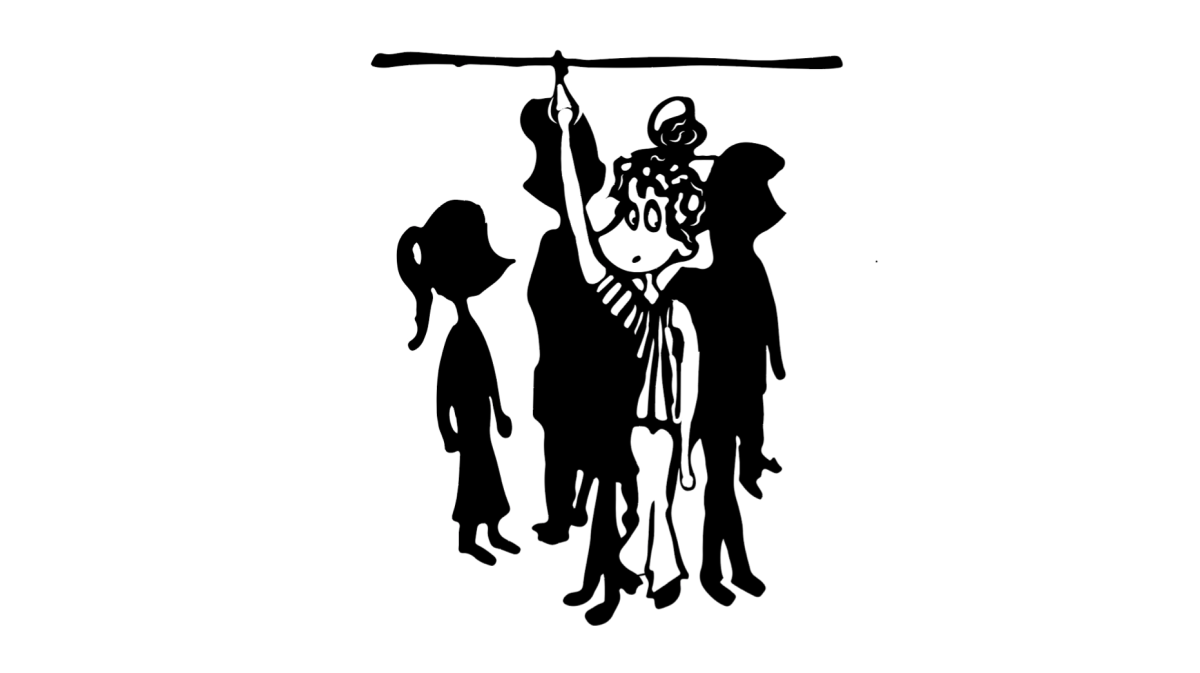What should we do when we feel unsafe on Victoria buses?

Illustration by Sage Blackwell.
It happens unexpectedly, like your bus getting delayed for the third time. You decide to take a double-decker filled with students to get downtown on time, taking a seat on the upper level, listening to music. Soon, a shabbily dressed man, appearing under the influence, sits opposite you and begins talking to himself. His behavior gets increasingly aggressive. However, there are many commuters around you so you decide to increase the volume of your music to drown out his voice.
The situation escalates when the man swears and spits. His spit hits the window and splatters on the teenaged girl in front of him. Shocked, you leave the upper level, alerting the bus driver, who contacts bus security. Passengers on the upper level quickly move downstairs for safety. At the next stop, the man exits the bus. Security arrives two stops later, causing further delays. Thankfully nobody was injured. This happened to me, and was the first time I felt unsafe on public transit.
Another UVic student, who prefers to remain anonymous and will be referred to as Sarah, recounts a terrifying transit incident involving a man with a hunting knife. The man stared at everyone aggressively before fleeing the bus and evading police. Shaken, Sarah stayed on the phone with a loved one and exited only when she felt safe. Since then, she has avoided the bus, preferring seats with full visibility and quick exit access. She wishes the university offered transportation alternatives.
Would you have done anything differently in either of these situations? Maybe not, but there are safety precautions you can take to avoid getting hurt.
In a written statement to the Martlet, a UVic spokesperson listed tips to raise awareness about bus safety for students.
“At the beginning of each term in January and September, students receive a lot of safety information. Campus Security (CSEC) covers bus safety tips during new student orientation events, especially for international students who may be particularly vulnerable,” reads the statement.
UVic’s bus safety tips for students include:
- Sit near the driver.
- If someone bothers you, tell the driver and stay on the bus.
- Ride with friends, if possible.
- Know how to request a “special stop” closer to your off-campus housing.
- Keep valuables out of sight.
- How to call Campus Security and 9-1-1 for assistance.
- Using the UVic Safety app to contact emergency services.
According to the spokesperson, CSEC and BC Transit collaborate year-round. “Should an incident occur while a student is traveling to or from UVic, students are encouraged to contact 9-1-1 and/or Campus Security. This ensures appropriate authorities to investigate and provide support,” reads the statement.
The Victoria Regional Transit Commission makes many decisions regarding transit services in the Victoria region. A UVic spokesperson says the student representative on the Commission — Prince Solanki, a student at Camosun College — can be an effective voice in raising safety concerns.
The bystander section of the university’s sexualized violence prevention and response training also addresses how to deal with harmful behavior on the bus. Additionally, students concerned for their safety have access to supports like Safewalk, a 24/7 service where Campus Security staff escort individuals on campus, including to the Ian Stewart Complex.
“The Campus Security front office, located next to the main bus loop, is a safe haven for anyone needing assistance. Students are encouraged to contact 9-1-1 and/or Campus Security if an incident occurs. CSEC can connect students to appropriate supports, resources, or partner agencies.”
Students may also access supports directly, including:
- SupportConnect, a confidential mental-health support service available free of charge to UVic students, connecting them with qualified counselors, consultants and life coaches.
- UVic’s Student Wellness Centre, which offers holistic wellness support including mental health and spiritual care.
- The Sexualized Violence Resource Office and Equity and Human Rights, offering information and support on making a disclosure or report to the university.
- Academic concessions if an incident affects a student’s ability to focus on their studies.






